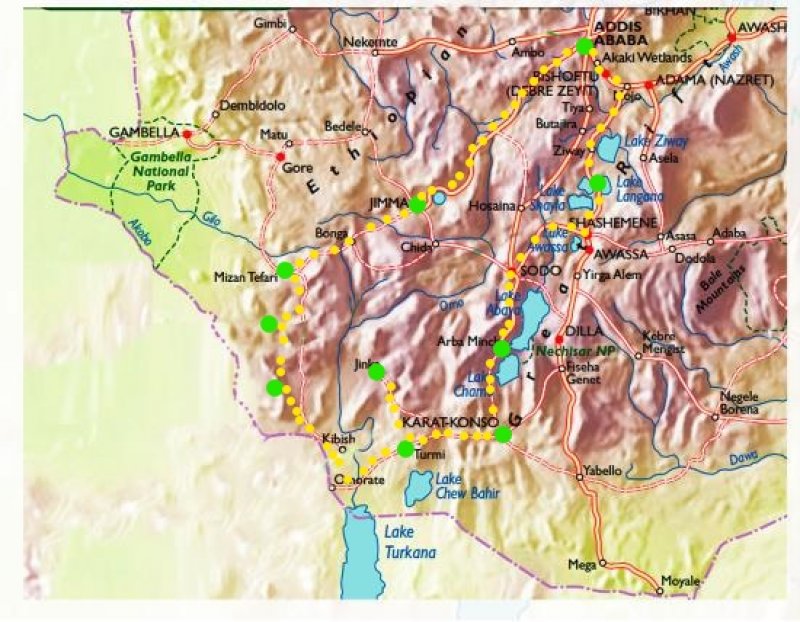Southwestern Ethiopia: coffee plantations, Omo Valley and Rift Valley (minimum of 6 persons) ------- from 1.440 €
16 days
You can come on the dates that suit you best during all the year
This is a tour to the southwest of Ethiopia - one of the areas least visited by travelers - to explore wild jungles and tropical forests that host coffee plantations of enormous size and beauty. The subtropical forest here is home to the most unique and proud tribe of the Omo Valley: the Surma. We will camp with them to get to know them more closely which is an experience that will be stamped in our memory for a lifetime.
We also enter the Omo National Park in search of wild animals and to meet the Nyangatom, the eternal guardians of the savannah. We then drive further down the south to reach the majestic Omo River and meet other tribal clans: Karo, Banna, Dassenech, Tsemay, Hamer and Mursi.
On the route back to Addis Ababa, we drive along the Rift Valley to navigate its lakes full of crocodiles, hippos and hundreds of wild birds.

Day 1 – Addis Abeba
Arrival in addis ababa - visit the capital, merkato, national museum - hotel in Addis Ababa
Day 2 – Jimma
A 4x4 trip to jimma - landscapes, oromo villages - hotel in Jimma.
Day 3 – Mizan Teferi
Drive to Mizan Teferi - Bench villages - Wushwush tea plantations - Local hotel in Mizan Teferi.
Day 4 – Surma Area
Coffee plantations in Bebeka - Surma village - Wild camping in Surma village.
Day 5 - Surma Area
Day of exploration of the Surma zone - wild camping in Surma village.
Day 6 – Adika
Drive to Adika - Dizi villages - Primary forests - Camping in Dizi village.
Day 7 – Omo national park
Sabana - Omo national park - Camping near the Mui river.
Day 8 – Omo national park
Game drive in search of wild animals - Walks in the savannah - Camping near the Mui river.
Day 9 – Murulle
Savannah - Nyangatom villages - Crossing the Omo river - Karo villages - Lodge in Murulle
Day 10 – Turmi
Dassenech villages - Hamer villages - Camping in Turmi
Day 11 – Turmi
Tribal markets - Erboré villages - Camping in Turmi.
Day 12 – Jinka
Tribal markets - Ari villages - Ethnographic museum - Hotel in Jinka.
Day 13 – Konso
Aldeas mursi - Konso villages - Lodge in Konso.
Day 14 – Arba Minch
Chamo lake, Crocodiles, Hippos - Nechisar national park - Local hotel in Arba Minch
Day 15 – Langano Lake
Great Rift valley - Abaya and Langano lakes - Lodge on the shores of Lake Langano.
Day 16 – Addis Abeba – End of the Trip
Abiata-shala lakes national park – Drive back to Addis Ababa - free time - Traditional farewell dinner - International flight.
Note: A group of at least 4 people with a minimum of 2 4x4 vehicles is needed to carry out this trip. apart from the travelers’ vehicles, an extra car to transport kitchen equipment, food and the cook is required. on this route, remote areas are visited where mutual assistance between vehicles is expected.
Price of the southwestern trip 16 days:
6 persons: 1.760 € (per person)
10 persons: 1.600 € (per person)
14 persons: 1.440 € (per person)
The transportation on this trip is designed for you to travel through Ethiopia in a relaxed way and enjoy to the fullest the daily life of the country. The vehicles for this tour are 4x4. These vehicles reach everywhere, are comfortable, safe and powerful.
Accommodation during the first part of the route is very basic with the exception of Jimma. The southwest of Ethiopia is not touristic and infrastructures are scarce. The local hotels have many deficiencies of water and electricity and, above all, service. They are hotels of passing by...
Once inside the wild areas, we will camp for free in areas that travelers and drivers decide. In these camping, we carry all the materials with us. It’s also good to note that there are no showers and hence we will use river water stored in drums for washing. Breakfast, lunch and dinner are included during the camping days.
At the end of the trip we will have access to lodges of higher quality and comfort.
In the cities we do not include lunch and dinner to give the traveler more freedom. Sometimes you do not feel like dining, or you want to just have a juice. Contrary to what one might think, in Ethiopia there are restaurants everywhere, open at all hours and with local and western food, rich, cheap and in abundance.
